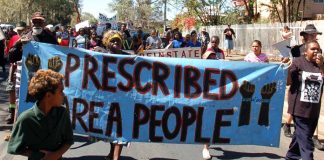In July Aboriginal elders from the Ampilatwatja community began a walk-off protest against the Intervention. Solidarity spoke to Richard Downs, one of the protest leaders.
Where has the idea of the walk-off come from?
In the 1940s a few of our Alyawarr elders, now in their mid-80s, were involved in a walk-off from Lake Nash station. They were standing up to get the same rights as the white people. They were just getting paid with flour, tea, sugar, clothing and boots.
And also over in Western Australia at that time, the Communist Party of Australia were involved supporting a walk-off. With the unions, people all came together as one, to stand against how the Aboriginal people were treated. Then with the Gurindji mob, the Wave Hill walk-off, unions and people from all over Australia got involved in that.
With the Intervention and its impacts, the government is trying to shut us down and turn a blind eye, so we thought we should use this strategy now and walk out. We have walked away from the community and the control measures imposed by government.
Over the last 30-40 years Aboriginal people have been pushing for Land Rights—to get ownership over the lands that were taken from us. We never sold it. We were herded and pushed into these little communities—missions or reserves. When Land Rights came in those places were recognised as owned by us, part of our country, for us to live, set up schools and programs that will help us go forward.
With the compulsory acquisition by the government we’ve lost everything we’ve fought for. The government is completely controlling the place.
Disgraceful housing conditions played a part in sparking the walk-off, with sewage overflowing out into the streets of the community. How has the Intervention impacted on housing?
Before, as part of the local government, we had our own housing association. An office, a workforce, a housing team. We stayed on top of everything, with the sewage, repairs and maintenance.
When the Intervention first came everyone thought, “well this is good”, because over the years we’ve tried to get extra funding for a lot of things. We thought there would be more focus on repairs and maintenance, new housing, upgrades etc.
Two years later there’s nothing at all. The houses are let go. We’ve been told we’re not getting any new housing. The community council office, under the new Shire and Intervention control, has been taken away from us as a place of resource, where we can provide service for the community and surrounding outstations. Now we have no telephones, no office, nothing. We’ve gone back to bare nothing.
Minister Jenny Macklin is talking about re-instating the Racial Discrimination Act (RDA). But measures like Income Management and compulsory land acquisition will remain. Macklin is saying there has been an extensive consultation process throughout the NT. How would you respond to this?
Look our feelings are that the Intervention has got to be completely done away with. Where is the original Little Children are Sacred report that was done by Rex Wilde and Pat Anderson? There’s 97 recommendations that Aboriginal people across the NT feel comfortable with. We’ve got to put that back on the table and get rid of this Intervention that’s been initiated by the Liberal party with the support of Labor.
When Macklin talks about consultation with Aboriginal people it’s just about ticking boxes that’s all. The government made their decision about going forward with the Intervention before those meetings started.
What has been the impact of conservative Aboriginal spokespeople pushed forward by Government?
The likes of Warren Mundine—these people are living in a fantasy world. They have no idea what it’s like out there—no connection with the grassroots Aboriginal people, they just spend their time in offices engaging with Ministers. People like that are no use to us at all.
Union officials from NSW have spent time at your camp and you are speaking to trade unions in Sydney during this tour. Why is this important?
This is about standing up for human rights, standing up for people that are being abused by the government. We all have problems in Australia both black and white and we need to support each other. I definitely feel encouraged with the unions coming on board. They helped our people in the 40s, in the 60s—it’s time to come together now.





